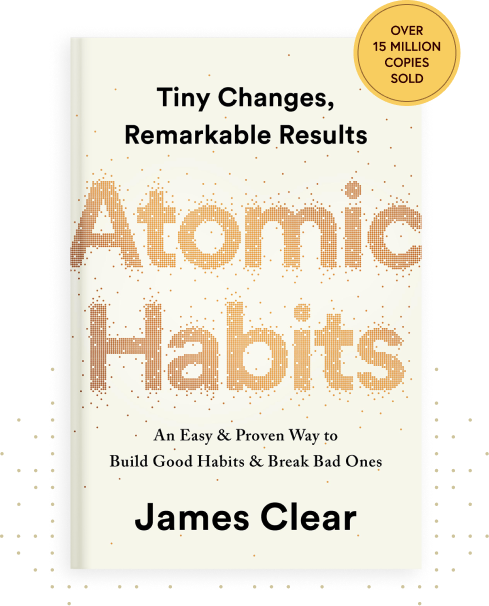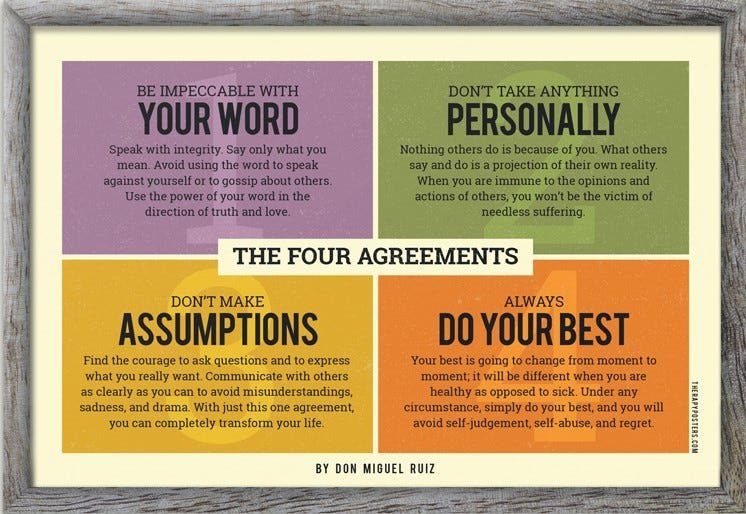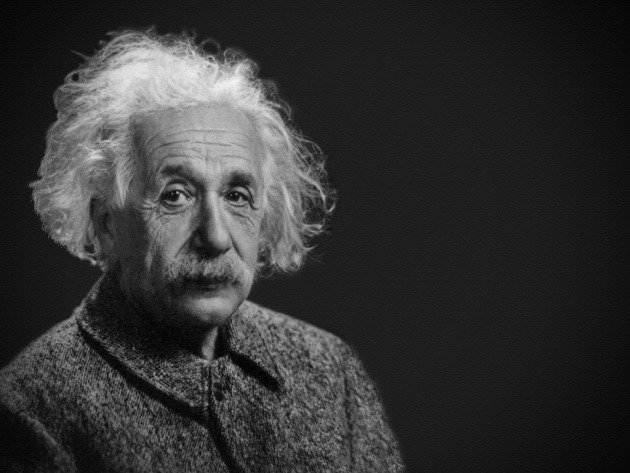The Four Agreements by Don Miguel Ruiz
In “The Four Agreements,” Don Miguel Ruiz draws from the rich heritage of ancient Toltec wisdom to present four fundamental principles that serve as a guide for personal freedom and happiness. These agreements—’Be impeccable with your word,’ ‘Don’t take anything personally,’ ‘Don’t make assumptions,’ and ‘Always do your best’—provide practical tools for overcoming self-limiting beliefs and fostering a life imbued with integrity, joy, and love.
The first agreement, ‘Be impeccable with your word,’ emphasizes the power of language. By speaking with integrity and avoiding gossip, lies, and negativity, individuals can build trust and respect in their relationships. This agreement serves as a foundation for personal credibility and emotional well-being.
The second agreement, ‘Don’t take anything personally,’ encourages readers to understand that the actions and words of others are a reflection of their own realities, not a measure of one’s worth. By not taking things personally, individuals can develop resilience and maintain a sense of self-esteem, thereby reducing unnecessary emotional suffering.
‘Don’t make assumptions,’ the third agreement, advocates for clear communication and understanding. Assumptions often lead to misunderstandings and conflict. By asking questions and expressing needs and desires directly, individuals can avoid miscommunication and build stronger, more fulfilling relationships.
The fourth agreement, ‘Always do your best,’ acknowledges that one’s best effort varies from moment to moment, depending on circumstances. This principle encourages individuals to put forth their best effort in every situation, fostering a sense of satisfaction and purpose. It also teaches the importance of self-compassion, as doing one’s best is about striving for excellence without self-judgment or regret.
By embracing these four agreements, readers can transform their lives significantly. They promote mental and emotional health, enhance the quality of relationships, and help individuals live more authentically. Don Miguel Ruiz’s timeless wisdom in “The Four Agreements” offers a roadmap for anyone seeking to elevate their life and achieve true personal freedom.

The Art of War by Sun Tzu
Written over two millennia ago, “The Art of War” by Sun Tzu remains a seminal text in understanding strategy, leadership, and conflict resolution. This ancient Chinese military treatise is more than a guide for battlefield tactics; it offers profound insights applicable to personal and professional spheres. Readers can glean valuable lessons on preparation, adaptability, and strategic thinking, which are essential for navigating life’s challenges.
One of the key takeaways from “The Art of War” is the importance of preparation. Sun Tzu emphasizes that thorough planning and understanding one’s environment are critical for success. This principle extends beyond military applications; in everyday life, careful preparation can lead to better outcomes in projects, relationships, and personal goals. Being well-prepared allows individuals to anticipate potential obstacles and devise effective strategies to overcome them.
Adaptability is another crucial lesson from Sun Tzu’s work. The ability to adjust one’s plans in response to changing circumstances is a hallmark of effective strategy. In today’s fast-paced world, the capacity to pivot and adapt to new information or unexpected events is invaluable. Whether in business, where market conditions can shift rapidly, or in personal endeavors, where unforeseen challenges may arise, adaptability ensures continued progress and resilience.
Strategic thinking, as outlined by Sun Tzu, involves a deep understanding of both oneself and one’s adversaries. This principle encourages individuals to assess their strengths and weaknesses, as well as those of others, to make informed decisions. By applying strategic thinking, one can identify opportunities, mitigate risks, and navigate complex situations with greater clarity and confidence.
“The Art of War” transcends its historical context, offering timeless wisdom that can transform how we approach various aspects of life. By embracing Sun Tzu’s principles of preparation, adaptability, and strategic thinking, readers can enhance their decision-making processes and effectively address challenges, ultimately leading to a more successful and fulfilling life.

The Power of Now by Eckhart Tolle
Eckhart Tolle’s seminal work, The Power of Now, underscores the profound importance of living in the present moment. The book delves into the detrimental effects of dwelling on past regrets and anxieties about the future, advocating instead for a focus on the here and now. According to Tolle, the present moment is the only time we truly have, and embracing it fully can lead to a significant transformation in one’s life.
One of the core tenets of The Power of Now is the practice of mindfulness—a state of being where one is fully immersed in the present experience without judgment. Tolle provides practical advice on how to achieve this state, such as through conscious breathing techniques and the deliberate observation of one’s thoughts. By quieting the mind, individuals can break free from the incessant chatter that often dictates their emotions and actions.
Furthermore, Tolle addresses the common negative thought patterns that many people fall into. He explains how these patterns are rooted in the ego, which thrives on identifying with past experiences and future worries. By recognizing and detaching from these thoughts, readers can overcome the limitations imposed by their own minds. This detachment allows for a deeper connection to one’s true self, which Tolle describes as a state of inner peace and tranquility.
The benefits of adopting the principles outlined in The Power of Now are manifold. Readers may experience a significant reduction in stress as they learn to let go of unnecessary mental burdens. Moreover, the enhanced state of mindfulness can lead to a greater sense of well-being and fulfillment. By shifting their perspective to prioritize the present moment, individuals can cultivate a more meaningful and enriched life.

Man’s Search for Meaning by Viktor E. Frankl
“Man’s Search for Meaning” by Viktor E. Frankl is more than just a book; it is a profound journey through the depths of human suffering and the heights of human resilience. As a Holocaust survivor and a renowned psychiatrist, Frankl offers a unique perspective on finding purpose amidst unimaginable adversity. His experiences in Nazi concentration camps serve as the backdrop for his exploration of ‘logotherapy,’ a form of existential analysis that emphasizes the pursuit of meaning as the primary human drive, rather than the pursuit of pleasure.
Frankl’s narrative is both harrowing and enlightening, providing readers with powerful insights into the human capacity for endurance and growth. He argues that even in the most dire circumstances, individuals can find a sense of purpose that enables them to transcend their suffering. This perspective is not only a testament to the resilience of the human spirit but also a guide for anyone grappling with their own life’s challenges.
One of the key takeaways from “Man’s Search for Meaning” is the idea that life’s meaning can be discovered in three main ways: through work, love, and suffering. Frankl illustrates this with poignant anecdotes and philosophical reflections, encouraging readers to seek out what gives their life true significance. Whether it is through creating something valuable, forming deep connections with others, or finding meaning in life’s inevitable struggles, Frankl’s insights are both timeless and universal.
By integrating these principles into our daily lives, we can cultivate a more resilient and purposeful existence. “Man’s Search for Meaning” is not just a recounting of historical events but a timeless guide to understanding the importance of finding meaning, even when faced with life’s greatest challenges. For those seeking to transform their lives for the better, this book offers invaluable wisdom and a path to a more meaningful existence.

Atomic Habits by James Clear
“Atomic Habits” by James Clear presents a transformative approach to personal development through the science of habit formation. Clear’s central thesis is that small, incremental changes, or “atomic habits,” can lead to significant and lasting improvements in one’s life. The book delves into the psychological and neurological foundations of habits, providing readers with a deep understanding of why they form and how they can be altered.
A key concept in “Atomic Habits” is the idea of identity-based habits. Rather than focusing solely on outcomes, Clear suggests that we should align our habits with the person we aspire to become. For example, instead of aiming to read a certain number of books, one should cultivate the identity of a reader. This shift in mindset helps to make the desired behavior a natural part of one’s identity, thereby increasing the likelihood of sustained change.
Another significant aspect of the book is the role of the environment in shaping behavior. Clear emphasizes that our surroundings can either hinder or facilitate the habits we wish to adopt. By making small adjustments to our environment, such as placing a book on the nightstand to encourage reading before bed, we can create a supportive context that makes good habits easier to maintain.
Clear also introduces the concept of “habit stacking,” a strategy where new habits are built upon existing ones. By linking a new habit to a well-established one, such as doing push-ups immediately after brushing your teeth, it becomes easier to integrate the new behavior into your daily routine. This technique leverages the established neural pathways of the existing habit, making the adoption of new habits more seamless.
Implementing the principles outlined in “Atomic Habits” can lead to substantial improvements in various aspects of life, including productivity, health, and overall well-being. By focusing on small, manageable changes and understanding the science behind habit formation, readers can create lasting positive transformations.









